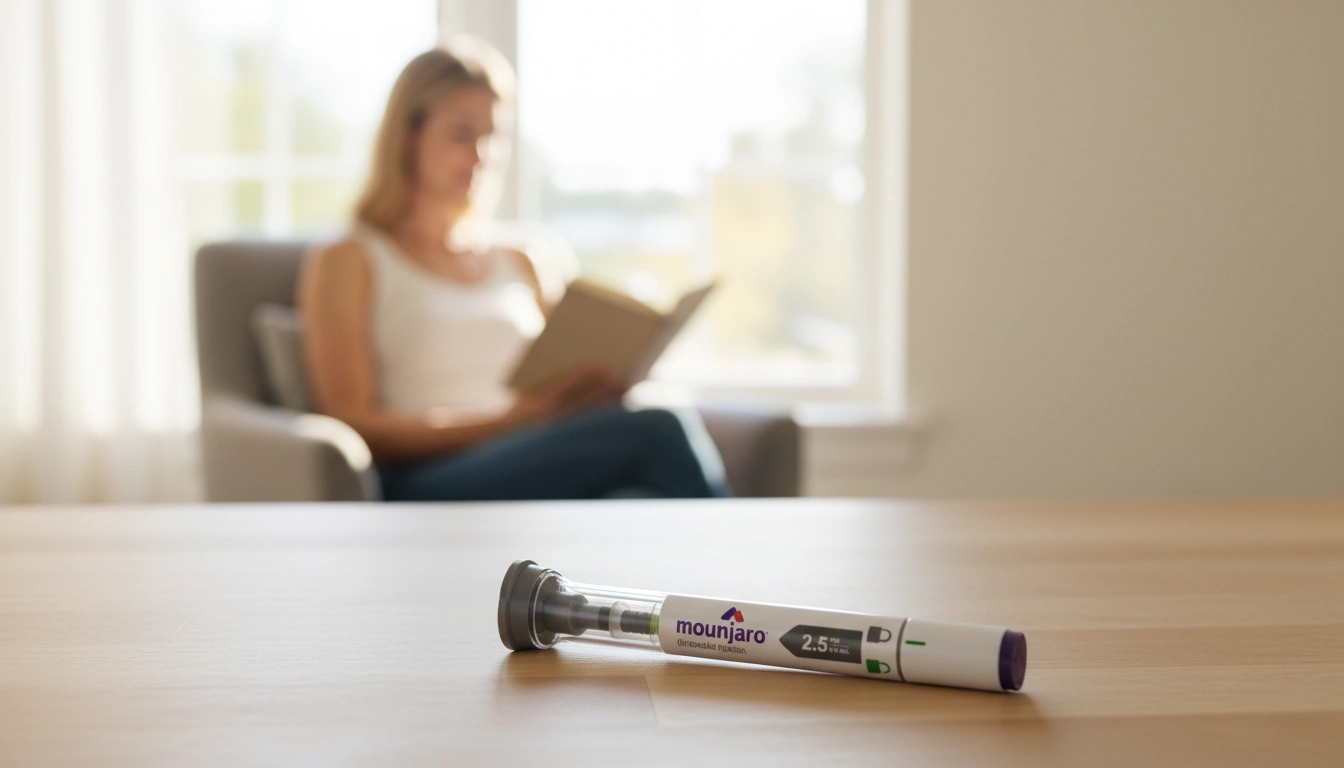How to Stop Mounjaro Hair Loss: Effective Strategies and Insights

Introduction
Have you recently started Mounjaro (tirzepatide) and noticed more hair shedding than usual? You’re not alone. For people on this groundbreaking weight loss medication, hair loss is an unexpected and often worrying side effect. While Mounjaro has transformed many lives by enabling significant, sustainable weight loss, reports of hair thinning or shedding can cause distress during an already challenging journey. Understanding why this happens, how to prevent it, and what steps to take if you face this issue is critical to maintaining confidence and well-being as you progress toward your health goals.
At TrimRx, our mission is to support you through every aspect of your personalized weight loss journey, including addressing concerns like hair loss. Together, we’ll explore the science behind Mounjaro-related hair shedding, practical prevention and management tips, and how a balanced approach to nutrition and care can help your locks bounce back. We’ll also show how our comprehensive programs, including doctor consultations, lab work, and expert guidance, fit into a supportive, medically supervised plan tailored uniquely for you.
By the end of this post, you’ll have a clear understanding of why hair loss can occur on Mounjaro and learn actionable steps to protect and restore your hair while achieving safe, effective weight loss. Ready to take control of your health without compromising your hair? Let’s dive in.
What Is Mounjaro and Why Is It Used?
Mounjaro, the brand name for tirzepatide, is a novel injectable medication originally developed to treat type 2 diabetes. Recently, it gained FDA approval for weight management in adults with obesity or overweight conditions accompanied by related health challenges like high blood pressure or high cholesterol.
This medication works uniquely as a dual glucose-dependent insulinotropic polypeptide (GIP) and glucagon-like peptide-1 (GLP-1) receptor agonist. Through these mechanisms, Mounjaro helps regulate blood sugar levels, reduce appetite, and promote fat loss. Clinical trials have shown impressive average weight loss outcomes, with some patients losing over 20% of their body weight when combined with a healthy diet and lifestyle. This level of weight loss often translates into improved health markers, such as better blood sugar control and reduced cardiovascular risk.
At TrimRx, our personalized weight loss programs incorporate such clinically proven medications, paired with supportive medical oversight and tailored lifestyle advice to ensure the safest, most sustainable results. If you’re interested, you can take our free assessment quiz to see if you qualify for a personalized Mounjaro treatment plan. Start your quiz here.
Does Mounjaro Cause Hair Loss?
While hair loss is not officially listed as one of the most common side effects of Mounjaro, clinical data and real-world reports have identified hair thinning or shedding—known medically as alopecia—as an uncommon but notable occurrence, affecting approximately 4-6% of people on the medication.
However, the exact cause of hair loss associated with Mounjaro is not fully understood. Current scientific consensus suggests the hair shedding is an indirect effect rather than a direct action of the drug on hair follicles. Instead, the hair loss is typically linked to the rapid weight loss often experienced when starting Mounjaro.
This rapid weight reduction places physiological stress on the body, potentially triggering a condition called telogen effluvium, a temporary disruption of the natural hair growth cycle that results in excessive hair shedding. Other factors, such as potential nutritional deficits, hormonal shifts, and stress, may amplify this effect.
It’s important to emphasize that not everyone on Mounjaro experiences hair loss, and when it does occur, it is usually temporary with hair regrowth coming after the body adjusts and stabilizes.
If you experience notable hair thinning or shedding, it’s a good idea to:
- Talk to your healthcare provider
- Review your nutritional intake
- Monitor your rate of weight loss
- Consider appropriate supplementation
At TrimRx, our approach helps patients manage potential side effects through ongoing medical consultation and personalized support, ensuring you get the best care throughout your weight loss journey.
Understanding Telogen Effluvium: The Main Cause of Mounjaro-Related Hair Loss
To understand how hair loss manifests on Mounjaro, let’s take a closer look at telogen effluvium, the most common culprit behind medication and rapid weight loss-related hair shedding.
What Is Telogen Effluvium?
Our hair naturally cycles through three phases:
- Anagen phase (growth): Lasts several years, where hair actively grows.
- Catagen phase (transition): A short phase where growth slows.
- Telogen phase (resting and shedding): Lasts around 3 months, when hair follicles rest and old hairs fall out to make room for new growth.
Normally, about 7-10% of hair follicles are in the telogen phase at any given time, resulting in daily shedding of approximately 50-150 hairs—a totally normal process.
Telogen effluvium occurs when an external or internal stressor causes a much larger percentage of hair follicles (up to 35%) to enter the telogen phase prematurely. This leads to excessive shedding, often noticeable as thinning hair, increased strands in the shower drain, or visible hair loss especially along the scalp.
Why Does Rapid Weight Loss Trigger Telogen Effluvium?
Sustaining rapid weight loss—commonly seen with treatments like Mounjaro—can cause several stress-related changes:
- Metabolic stress: The body adapts to sudden calorie deficits and fat loss, shifting energy away from non-essential functions like hair growth.
- Nutrient deficiencies: Restrictive diets may lack sufficient protein, iron, zinc, biotin, and vitamins critical for hair follicle health.
- Hormonal fluctuations: Weight loss and changes in insulin, thyroid, and sex hormone levels can influence hair cycles.
- Physical and psychological stress: Starting new therapies or lifestyle changes raise cortisol levels and inflammation, further disrupting hair growth.
Telogen effluvium usually becomes apparent 2-3 months after the triggering event—matching the timeline many patients report starting to notice shedding when on Mounjaro.
Notably, telogen effluvium is temporary and reversible. Once the body adjusts, nutrient stores replenish, and weight stabilizes, hair follicles typically resume normal growth, and thickness returns within 6 to 12 months.
How to Stop Mounjaro Hair Loss: Key Strategies
While temporary hair shedding can be frustrating, there are effective ways to minimize hair loss and support regrowth during your Mounjaro journey. Here are crucial strategies grounded in science and expert advice:
1. Maintain a Balanced, Nutrient-Rich Diet
Nutrition is cornerstone to minimizing hair loss, especially during weight loss. Hair follicles require ample calories and specific nutrients to grow and stay healthy.
- Protein: Make protein a priority in every meal since hair is primarily made of keratin, a protein. Aim for high-quality sources such as lean meats, fish, eggs, dairy, legumes, and plant-based proteins. At TrimRx, our personalized programs emphasize sustainable nutrition plans that meet your caloric and protein needs to prevent deficiencies.
- Iron: Iron deficiency anemia is a well-known cause of hair loss. Include iron-rich foods like spinach, lentils, red meat, and fortified cereals. Consider lab testing to check your iron status.
- Zinc and Biotin: These trace minerals and vitamins play a role in hair follicle function. While biotin supplements are popular, their benefit is mostly in correcting deficiencies; whole food intake is advisable.
- B Vitamins and Vitamin D: Important for overall hair health, find these in leafy greens, whole grains, fatty fish, and fortified foods.
- Omega-3 fatty acids: Found in fish oil and flaxseeds, these help reduce inflammation and support scalp health.
Avoid excessive calorie restriction which can exacerbate hair shedding. Instead, aim for gradual, steady weight loss typically between 0.5-1 kg (1-2 lbs) per week. Our experts at TrimRx help craft meal plans personalized to your metabolism and preferences to nourish your body fully during weight loss.
If you’re interested in starting support supplements alongside medications, consider our quick-access and scientifically formulated options such as GLP-1 Daily Support or Weight Loss Boost to complement your regimen.
2. Monitor and Manage Your Rate of Weight Loss
Rapid, drastic weight loss increases the risk of telogen effluvium. Slowing down your pace and following a gradual weight loss protocol allows your body to adjust:
- Follow prescribed Mounjaro dosing schedules carefully.
- Communicate with your healthcare provider about your weight loss rate.
- Avoid extreme calorie deficits.
- Prioritize sustained lifestyle changes over quick fixes.
TrimRx’s personalized consultation model supports dose titration and lifestyle coaching to balance effective weight loss with minimizing side effects like hair loss.
3. Prioritize Stress Reduction and Sleep
Physical and emotional stress contribute significantly to hair loss through increased cortisol levels and inflammation. Managing stress helps reset hair growth cycles.
- Practice mindfulness, meditation, or gentle yoga.
- Engage in regular physical activity within your capacity.
- Ensure 7-9 hours of quality sleep nightly.
- Seek professional help if anxiety or depression are barriers.
TrimRx recognizes the multifaceted nature of weight loss journeys and offers holistic guidance on stress management techniques as part of our personalized programs.
4. Practice Gentle Hair Care Habits
Protecting your hair from additional damage and breakage can help maintain thickness during periods of shedding:
- Use sulfate-free, nourishing shampoos that don’t strip scalp oils.
- Avoid harsh chemical treatments such as bleaching or frequent dyeing.
- Limit heat styling like blow-drying, straightening, or curling. When used, keep heat settings low.
- Choose soft hair ties (scrunchies) instead of tight bands to reduce hair follicle stress.
- Avoid hairstyles that pull tightly on the scalp (e.g., tight ponytails, braids).
- Consider scalp massages to improve circulation and scalp health.
5. Discuss Supplementation and Medical Treatments with Your Provider
While a balanced diet is primary, some individuals benefit from targeted supplements or hair growth therapies:
- Biotin and Collagen: May improve hair strength and texture, particularly if deficient.
- Iron and Vitamin D supplements if lab tests indicate deficiency.
- Minoxidil: Topical treatment shown to stimulate hair regrowth; use under medical supervision.
- PRP (Platelet-Rich Plasma) Therapy: A medical procedure using your own blood factors to promote hair follicle regeneration, available at specialized clinics.
Remember, not all supplements or treatments are suitable for everyone, especially when on other medications. At TrimRx, our medical clinicians work with you to monitor your labs and recommend safe interventions personalized to your condition.
6. Keep Open Communication with Your Healthcare Team
If hair loss persists beyond 6-12 months, worsens significantly, or is accompanied by other symptoms (patchy bald spots, scalp itching, or pain), it is crucial to seek evaluation for other causes such as:
- Thyroid disease
- Androgenetic alopecia
- Scalp infections or dermatitis
- Autoimmune disorders like alopecia areata
Routine blood work can check hormones, nutritional markers, and inflammatory signs. This holistic review ensures the right diagnosis and treatment plan.
At TrimRx, our integrated telehealth platform facilitates seamless provider communication, lab monitoring, and ongoing patient support to optimize both your weight loss and overall health outcomes.
What If Hair Loss Persists? Do I Need to Stop Mounjaro?
Most evidence suggests that hair shedding related to Mounjaro and rapid weight loss is temporary and reversible. Hair typically starts regrowing once your weight stabilizes and nutritional deficiencies are corrected.
Stopping Mounjaro abruptly is generally not recommended without professional guidance, as the medication provides important metabolic benefits beyond weight loss, especially for individuals with insulin resistance or type 2 diabetes.
If hair loss is bothersome, talk to your healthcare provider or the TrimRx care team. Possible management includes:
- Adjusting diet to optimize nutrients and calories
- Slowing the pace of weight loss
- Exploring adjunct therapies for hair growth
- Evaluating other possible causes of hair loss
Together, we can find the balance between achieving your weight loss goals and maintaining your hair health.
Summary: Taking a Balanced and Compassionate Approach
To wrap up, hair loss associated with Mounjaro is usually an indirect effect linked to the physiological stress of rapid weight loss and potential nutritional deficiencies. It is a temporary condition called telogen effluvium, with normal hair regrowth expected within several months after stabilization.
The best way to stop or prevent Mounjaro hair loss involves:
- Gradual, sustainable weight loss rather than drastic calorie cuts
- Ensuring sufficient protein and nutrient intake
- Managing stress and practicing gentle hair care
- Seeking medical guidance when needed
At TrimRx, our personalized, clinically supervised weight loss programs provide ongoing support in all these areas. Whether you’re interested in customized medication plans via our free assessment quiz or wish to supplement your journey with our quick-access GLP-1 Daily Support or Weight Loss Boost products, our team is here to guide you safely and effectively. Take the free quiz today to start your personalized plan!
FAQ
Q1: How soon after starting Mounjaro might I notice hair loss?
Hair shedding usually begins 2 to 3 months after significant weight loss starts, consistent with the timeline of telogen effluvium triggering the resting and shedding phase of hair follicles.
Q2: Is hair loss permanent when taking Mounjaro?
No, hair loss related to Mounjaro is typically temporary. Once your weight stabilizes and nutritional deficiencies are addressed, hair follicles usually resume normal growth within 6 to 12 months.
Q3: Can I prevent hair loss while losing weight on Mounjaro?
Yes. Aim for gradual weight loss, prioritize a protein-rich and nutrient-dense diet, reduce stress, and use gentle hair care practices to minimize hair shedding.
Q4: Should I stop taking Mounjaro if I experience hair loss?
You should not stop Mounjaro without consulting your healthcare provider. Hair loss can often be managed through dietary adjustments and supportive treatments without discontinuing the medication.
Q5: Are there supplements that can help with hair loss?
Supplements such as biotin, collagen, iron (if deficient), vitamin D, and zinc can support hair health. Always consult your provider before starting new supplements.
Q6: Can TrimRx help me manage hair loss while on Mounjaro?
Absolutely. Our personalized weight loss programs combine prescription medications with medical consultation, lab work, nutritional guidance, and comprehensive support to ensure your journey is safe and sustainable.
Q7: How do I know if my hair loss is caused by Mounjaro or another condition?
Persistent, severe, or patchy hair loss should be evaluated by a healthcare professional to rule out other causes such as thyroid problems, alopecia areata, or scalp infections. We recommend lab testing and possibly seeing a specialist like a dermatologist or trichologist.
Hair loss during Mounjaro treatment often feels discouraging, but with the right understanding and strategies, you can protect your hair while achieving meaningful weight loss. At TrimRx, we’re dedicated to walking alongside you every step of the way, combining science, empathy, and personalized care to help you succeed. Take our free, no-obligation quiz today to discover the program that’s right for you and begin your best journey yet.
Take the free assessment quiz now!
Explore GLP-1 Daily Support
Explore Weight Loss Boost
Embrace your health, nourish your body, and trust the process—we’re here for you.

Transforming Lives, One Step at a Time
Keep reading
Navigating Nutrition: What to Eat with Mounjaro for Optimal Results
Maximize your Mounjaro results! Discover what to eat with Mounjaro to enhance weight loss, manage side effects, and build healthy habits. Get expert diet tips now!
Optimizing Your Journey: What to Eat During Mounjaro Treatment
Maximize Mounjaro’s benefits with our guide on what to eat during Mounjaro treatment. Discover foods that boost weight loss, manage side effects, and optimize your health. Start your journey today!
Can I Eat Mango on Mounjaro? A Deep Dive into Diet and Weight Management
Can I eat mango on Mounjaro? Get expert insights on fruit choices, what to eat, and what to avoid to maximize your weight loss with Mounjaro. Discover your personalized plan!



